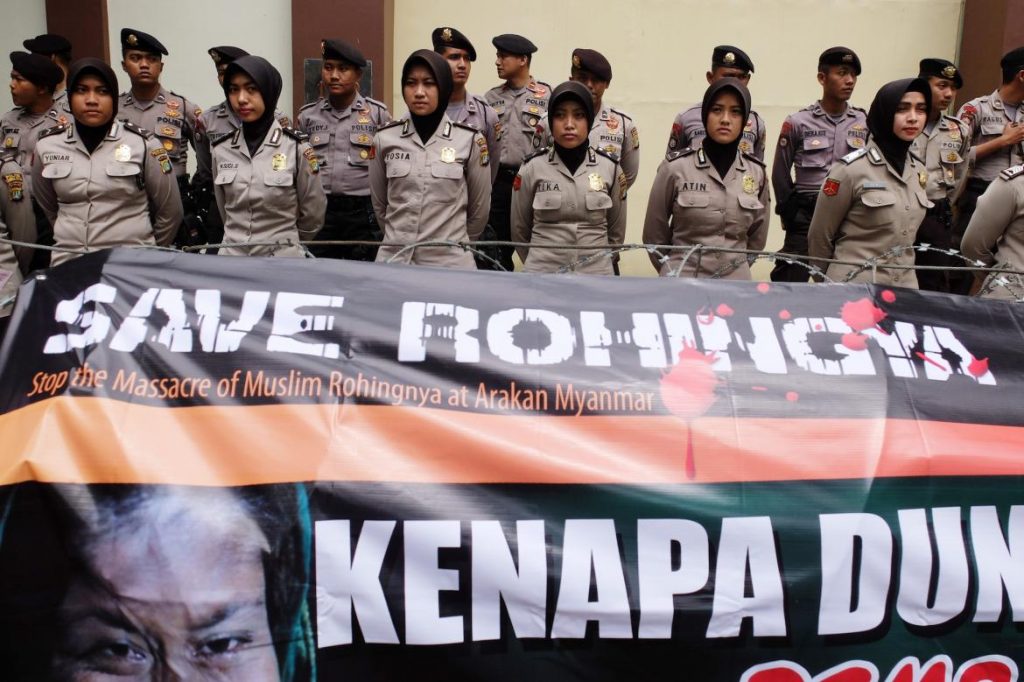By SHAFIQUL ALAM | AFP
DHAKA — Angry protesters took to the streets from Jakarta to Dhaka on Friday to denounce Myanmar over allegations of indiscriminate killing and rape in a military crackdown on the country’s Rohingya Muslim minority.
Around 5,000 Bangladeshi Muslims demonstrated in the capital Dhaka after Friday prayers, with hundreds more protesting in Kuala Lumpur, Jakarta and Bangkok to accuse Myanmar of ethnic cleansing in its northern Rakhine state.
Malaysia’s cabinet also issued a statement condemning the violence, an unusually strong criticism against a fellow member of the Association of Southeast Asian Nations.
“Malaysia… calls on the government of Myanmar to take all necessary actions to address the alleged ethnic cleansing,” the statement said.
Support more independent journalism like this. Sign up to be a Frontier member.
It said the Myanmar ambassador would be summoned over the crisis and that Malaysian Foreign Minister Anifah Aman would meet with State Counsellor Daw Aung San Suu Kyi and other top Myanmar officials “at the earliest possible date.”
Up to 30,000 Rohingya have abandoned their homes in Myanmar to escape the unfolding violence, the UN says, after troops poured into northern Rakhine following a coordinated attack on border guard outposts in October.
Rohingya are denied citizenship and subject to harsh restrictions in Buddhist-majority Myanmar, where many view them as illegal immigrants from neighbouring Bangladesh, though many have lived been in Myanmar for generations.
The Dhaka protesters gathered outside the Baitul Mokarram mosque, the country’s largest, to demand an end to the violence, denounce Suu Kyi, and calling for Bangladesh to accept fleeing Rohingya.
Around 500 Malaysians and Rohingya marched through a heavy tropical downpour from a Kuala Lumpur mosque to Myanmar’s embassy carrying banners denouncing the Rakhine “genocide.”
Abu Tahir, a 60-year-old Rohingya man who demonstrated with a chain coiled around his body, said he had been cut off from his family in Rakhine since he fled two years ago.
“The Rohingya are being treated like dogs, and are being killed,” he said, tears rolling down his face.
Amir Hamzah, 60, who heads the Malaysian Muslims Coalition, an NGO, said “the people of Malaysia strongly condemn” Myanmar’s actions.
“We want an immediate stop to the violence. This is cruel,” he said.
In Jakarta, around 200 demonstrators from Indonesian Islamic organisations protested outside Myanmar’s embassy.
They called for the government of Indonesia — the world’s most populous Muslim nation — to break off diplomatic ties with Myanmar and for Aung San Suu Kyi’s 1991 Nobel Peace Prize to be revoked.
“If they don’t want them, then it’s probably better to send them to another country. Don’t torture them like that in their own country,” said Maya Hayati, a 34-year-old housewife.
The UN says the stateless Rohingya are among the world’s most persecuted minorities.
The UN refugee agency says well over 120,000 have fled Rakhine since a previous bout of bloody unrest in 2012, many braving a perilous sea journey to Malaysia.
Last year, thousands were stranded at sea after a well-worn trafficking route through Thailand collapsed following a police crackdown sparked by the discovery of brutal human-trafficking camps along the Malaysia border.







